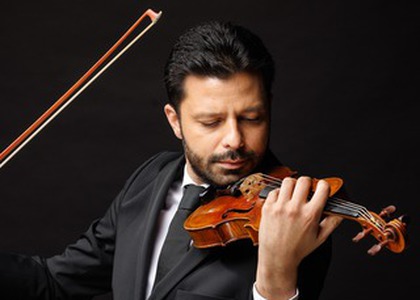> Interviews

Interview with violinist Răzvan Stoica, the protagonist of the project “A Stradivarius in Schools”
The project "A Stradivarius in Schools" reaches Bucharest in a few days. Accompanied by pianist Andreea Stoica, Răzvan Stoica plays the 1729 Stradivarius ex-Ernst violin at ColegiulSfantul Sava" today, and at Colegiul National "Gheorghe Lazar" on the 25th of April. The project aims to familiarize the young audience with classical music and proposes an unconventional strategy to access this field of art.
You propose pieces signed by George Friedric Handel, Johann Sebastian Bach, Joseph Haydn, Wolfgang Amadeus Mozart, Niccolo Paganini, Maurice Ravel, Igor Stravinsky, Ciprian Porumbescu and George Enescu for the recitals of this project. How did you come up with the musical program?
I thought that these concerts, although dedicated to a young audience less accustomed to classical music, should have a short introduction. That is to start with a bit more commercial pieces, such as Handel's sonnets or certain pages from Haydn, and continue with some modern ones, which are somehow more difficult to listen to, such as Stravinsky or Ravel, or even Ysaye's Sonata No. 6, which I play at these concerts. And I can say that the children's feedback was fantastic. They really like classical music, especially these pages of virtuosity.
What kind of feedback did the young audience give you?
Their reactions were a nice surprise. At the end of the concert, we had a Q&A session and they had very powerful feedback, just like the audience that frequently goes to concerts. I really must say that this project seems to have a very nice ending.
What are the difficulties that a new audience might face when listening to classical music, according to you?
To be honest, I think that it has a lot to do with social media. Today, everything about social media leads us to a frivolous musical area, and the younger ones do not have proper access to good quality music all the time through this social media. But, with the help of some classical music websites' live broadcasting, they will receive this opening which depends on how each person would use it or how much they would like it. However, on the bright side, the direct connection we create with them is a great help, the fact that they can see the violin, listen to these sounds coming from a violin with very powerful acoustics, and see us on stage, interacting as a duo in the pages of chamber music… I think it helps a lot.
What is the future of music education like, both formal and non-formal?
I would base my opinion on what I said earlier about social media, because children are always connected to their phones, the internet, to everything that social media represents. I think that better music advertising, especially classical music, would come in handy. Take the Netherlands, Germany or even Norway for example… I noticed that more and more young adults come across classical music on social media. As for Romania, the faster we implement and promote classical music on the internet, the young audience will be present in the concert halls.
Bearing in mind the actual circumstances, the problem you have noticed, which would be the ideal profile of today's performer, in your opinion?
It is a pretty complex question. We can no longer talk about the profile of the artist who arrogantly shows up on stage and starts playing, focusing on what he has to do. I think we have to approach the idea of getting closer to the audience, to the younger ones, the idea of better communication on stage as well, including the concerts, although we, as artists, are not used to directly talking with the audience, because we are accustomed to an etiquette on which we have been raised in conservatory or musical high schools. However, these days you need very good communication, opening to the audience. As an artist, you need to get closer to the audience - be it a young, or be it a well-informed one that attends concerts.
Translated by Cristina-Andreea Dobre,
University of Bucharest, Faculty of Foreign Languages and Literatures, MTTLC, year I
Corrected by Silvia Petrescu














